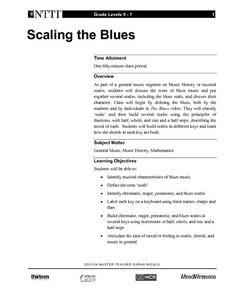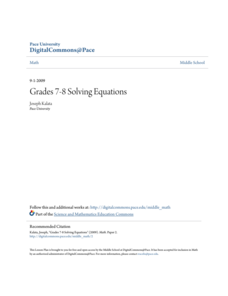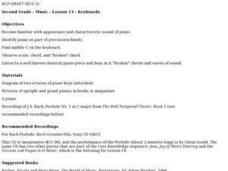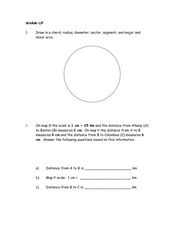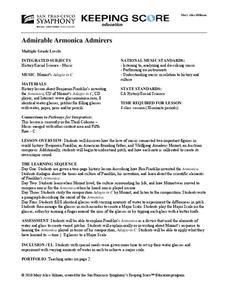Fun Music Company
The Harmonic Minor Scale
The harmonic minor scale, including the use of accidentals, is the focus of a one-page instructional activity that includes instructional information and practice exercises.
Music Fun
Overhead Transparencies
Classroom and studio music instructors will find this packet of 10 transparencies of major value. Images of treble and bass clefs, notes and rests, note values, time signatures, and music language are included. Nothing minor about this...
Curated OER
Scale Activities
How do you put something as large as the universe in perspective? Use a series of scale experiments. Classmates collaborate around four experiments to examine the scale of the earth-moon system, our solar system, the Milky Way galaxy,...
Curated OER
Scaling the Blues
Students identify musical characteristics of blues music and define the term 'scale.' They identify chromatic, major, pentatonic, and blues scales and label each key on a keyboard using letter names, sharps and flats.
Pace University
Grades 7-8 Solving Equations
Create a similar blueprint. The differentiated instructional activity has pupils work in teams to create a brochure, scale model, or blueprint of a selected house with some minor changes. Once finished, team members present their final...
Curated OER
Earthquake Power
In this earthquakes worksheet, students learn about the measurements of earthquakes on the Richter scale. They answer six questions about the magnitudes and sizes of earthquakes using two tables of data about earthquakes and the Richter...
Curated OER
The Stained Glass Window
Learners use centimeter rulers and the attached worksheet containing a scale drawing of a stained glass window. The actual measurements of the stained glass window are given, and students are asked to find the actual measurement of the...
Curated OER
Using the Distance Formula
In this distance formula activity, learners solve and complete 30 various types of problems. First, they find the exact distance between each pair of points and make a sketch of the situation. Then, students find the center, horizontal...
Curated OER
KEYBOARDS
Second graders become familiar with appearance and characteristic sound of piano, identify piano as part of percussion family, find middle C on the keyboard, observe scale, chord, and "broken" chord, and listen to a well-known classical...
Curated OER
Measuring Distance
In this measurement worksheet, students practice drawing 7 specific geometrical lines in a circle. Students problem solve 1 word problem with 3 measurements involving distance.
Curated OER
Improvising in the Birthplace of Jazz
Students recognize significant developments in New Orleans jazz music. They improvise blues licks using notes from a minor pentatonic scale.
Curated OER
Asteroids Between Mars and the Sun
In this asteroids of the solar system worksheet, students observe a diagram showing all the minor planets found in the orbit of Mars. Students answer 4 questions about the minor planets inside the orbit of other planets, they find the...
Space Awareness
The Intertropical Convergence Zone
Young scientists know it is hotter along the equator, but why is it also rainier? Through the process of completing two experiments and a worksheet, scholars discover the answer is the intertropical convergence zone. First, they...
Fun Music Company
Working Out the Key
"Gimme an E minor!" Or any key for that matter. But how do you figure out the key of a piece of music? Here's a instructional activity that shows young musicians three easy steps to help them identify the key of a piece of music.
Curated OER
Meet Louis Prima!
Students discover the difference in major and minor tonality after a brief introduction to Louis Prima. They discuss swing dancing and Louis Prima's role in the "Jungle Book" as the character King Louis. Students listen to the song...
Berklee College of Music
Create Your Own Afro-Latin Groove
The backbone of Latin American music is the beat! Young musicians work on blending Afro-Latin rhythms and beat patterns before incorporating the major pentatonic, minor pentatonic, and blues scales in their own compositions.
Fun Music Company
Classification of Intervals
Major 2nd, Perfect 4th, Minor 3rd. The number and classification of intervals are the focus of a one-page worksheet that asks musicians to write the intervals above given notes and to indicate the classification of others.
San Francisco Symphony
Admirable Armonica Admirers
What do Ben Franklin and Wolfgang Mozart have in common? Find out about the musical invention, the armonica or glassy-chord. Learners will read about how Ben Franklin invented this new instrument and how Wolfgang Mozart came to play it....
Illinois State Board of Education
Solar System
Aspiring astronomers solve problems involving mixed units of the same attribute, including time, money, length, and area. They convert large numbers into scientific notation, then compute and compare ratios to explain why drawing...
Curated OER
Lines & Spaces; Another Round
Fourth graders recall the letter names of the notes of the C-major scale and identify the names of the C-major scale. They identify the names of the lines and spaces on a music staff. They sing rounds.
Curated OER
Our Place in Space
Third graders identify the different planets that make up the solar system. In this space science lesson, 3rd graders construct a scale model of the major planets. They explore their different unique features and dress up as planets.
Curated OER
Poetry Scrap Book
After your poets have compiled several written poems into a scrap-book, use this grading scale to explain how they'll be graded. The only guiding explanation of the assignment explains that they need to use two of the five literary...
Curated OER
Intro to New Technologies in Music Education
Seventh graders, while in the computer lab utilizing a Sibelius software, create an eight-measure piece in the key of a minor using the notes A, B, C, D and E. They incorporate quarter notes, eighth notes and half notes. Each student...
Curated OER
Protecting the Herd
Learners explain how immunizing a significant proportion of a population against a disease prevents epidemics of the disease (herd immunity). They list factors that affect the proportion of a population that must be immunized to prevent...



